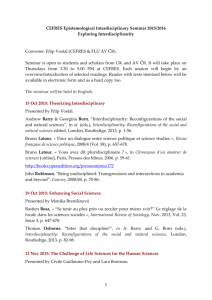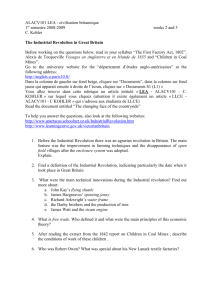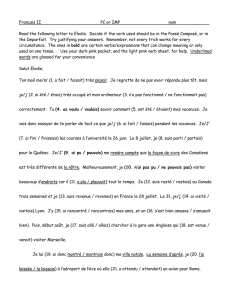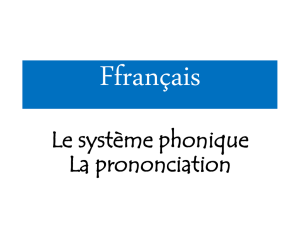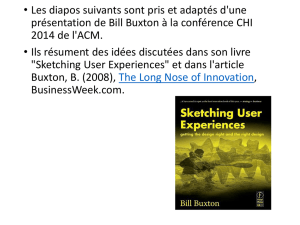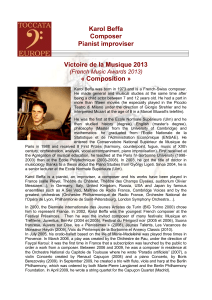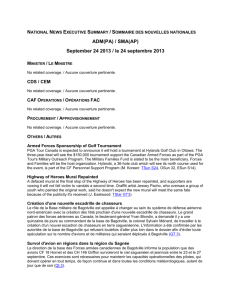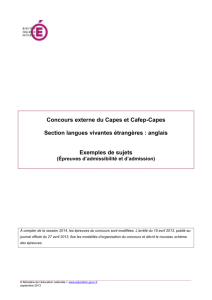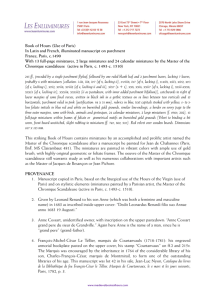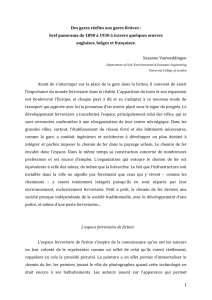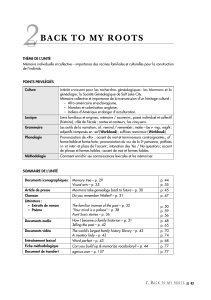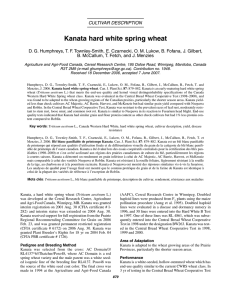The Passé Simple / Imparfait of French vs the Simple Past / Past
advertisement
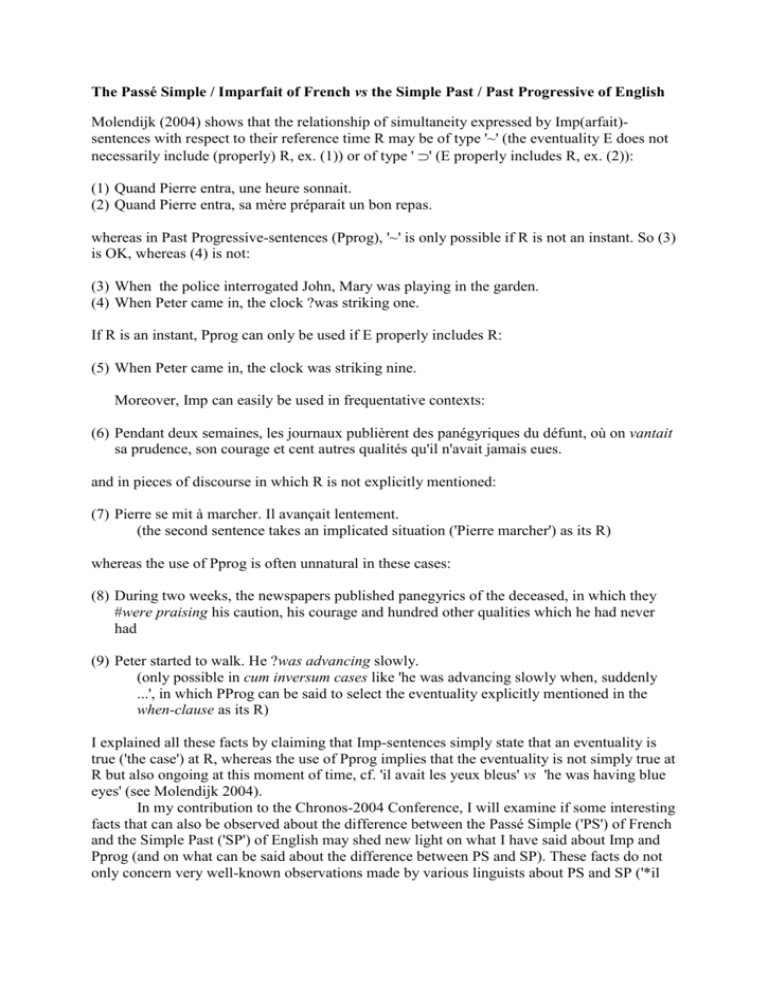
The Passé Simple / Imparfait of French vs the Simple Past / Past Progressive of English
Molendijk (2004) shows that the relationship of simultaneity expressed by Imp(arfait)sentences with respect to their reference time R may be of type '~' (the eventuality E does not
necessarily include (properly) R, ex. (1)) or of type '' (E properly includes R, ex. (2)):
(1) Quand Pierre entra, une heure sonnait.
(2) Quand Pierre entra, sa mère préparait un bon repas.
whereas in Past Progressive-sentences (Pprog), '~' is only possible if R is not an instant. So (3)
is OK, whereas (4) is not:
(3) When the police interrogated John, Mary was playing in the garden.
(4) When Peter came in, the clock ?was striking one.
If R is an instant, Pprog can only be used if E properly includes R:
(5) When Peter came in, the clock was striking nine.
Moreover, Imp can easily be used in frequentative contexts:
(6) Pendant deux semaines, les journaux publièrent des panégyriques du défunt, où on vantait
sa prudence, son courage et cent autres qualités qu'il n'avait jamais eues.
and in pieces of discourse in which R is not explicitly mentioned:
(7) Pierre se mit à marcher. Il avançait lentement.
(the second sentence takes an implicated situation ('Pierre marcher') as its R)
whereas the use of Pprog is often unnatural in these cases:
(8) During two weeks, the newspapers published panegyrics of the deceased, in which they
#were praising his caution, his courage and hundred other qualities which he had never
had
(9) Peter started to walk. He ?was advancing slowly.
(only possible in cum inversum cases like 'he was advancing slowly when, suddenly
...', in which PProg can be said to select the eventuality explicitly mentioned in the
when-clause as its R)
I explained all these facts by claiming that Imp-sentences simply state that an eventuality is
true ('the case') at R, whereas the use of Pprog implies that the eventuality is not simply true at
R but also ongoing at this moment of time, cf. 'il avait les yeux bleus' vs 'he was having blue
eyes' (see Molendijk 2004).
In my contribution to the Chronos-2004 Conference, I will examine if some interesting
facts that can also be observed about the difference between the Passé Simple ('PS') of French
and the Simple Past ('SP') of English may shed new light on what I have said about Imp and
Pprog (and on what can be said about the difference between PS and SP). These facts do not
only concern very well-known observations made by various linguists about PS and SP ('*il
eut les bleus' vs 'he had blue eyes', for instance), but also phenomena like the ones illustrated
by (10) and (11):
(10) "Quelle nuit!" dit-Pierre. En effet, c'était une nuit horrible. Le vent #hurla autour de la
maison
(11) What a night!" Peter said. It was a horrible night indeed. The wind howled around the
house
I will argue that the difference between (10) and (11) boils to the following explanatory facts.
The PS of French is not possible (by virtue of some essential characteristics that will be
presented during the talk) if the eventuality E cannot be presented as being the case at (a preestablished moment of time) R. (In (10), the howling of the wind cannot be presented as NOT
including Peter's words, so PS is bad). The SP of English, on the other hand, is only bad if we
are 'forced' to present E as ongoing at R. So (11) is OK, since something that may be seen as
ongoing at a moment of time R (note that Pprog 'was howling' can be used in (11)) is not
necessarily presented as such. In this regard, it is a well-known fact that states like be a bad
boy, have a good time etc., which may be things that can be seen as ongoing ('you are being a
bad boy', 'I am having a good time'), are not (at all) necessarily presented as such. They can be
'neutrally' referred to by sentences like 'you are a bad boy', 'I have a good time', etc. Similar
remarks can be made about the eventuality mentioned by the last sentence of (11).
Bibliography (selection)
Moeschler, J. (2004, to be published). 'Connecteurs pragmatiques, inférences directionnelles
et représentations mentales'. In A. Molendijk and C. Vets (eds.): Cahiers Chronos (2004),
Amsterdam/Atlanta: Rodopi.
Molendijk, A. (1993). 'Présuppositions, implications, structure temporelle', in : C. Vetters
(ed), Le temps, de la phrase au texte, Lille : Presses Universitaires de Lille, 167-191.
Molendijk, A. et H. de Swart (1998). 'Frequency and tense use in French', Belgian Journal of
Linguistics 12 : 42-60.
Molendijk, A. et C. Vet (1995). 'Interprétation, référence et cohésion'. In C. Vet (ed.),
Sémiotiques: Théories sémantiques et modélisation, Paris: Didier Erudition, 63 - 88.
Molendijk, A. (1996). 'Anaphore et imparfait: la référence globale à des situations impliquées
ou présupposées'. In W. de Mulder, L. Tasmowski - De Ryck and C. Vetterrs (eds.):
Anaphores temporelles et (in-)cohérence, Cahiers Chronos 1, Amsterdam/Atlanta: Rodopi,
109 - 123.
Molendijk, A. & H. de Swart (1998). 'Frequency and Tense Use in French'. In S. Vogeleer,
W. De Mulder, I. Depraetere (eds): The Contextual Processing of Tense and Aspect
(Belgian Journal of Linguistics 12), 43-60.
Molendijk, A. (2001). 'Frequency, iteration and tense use in French'. In: Reineke Bok Bennema, Bob de Jonge, Brigitte Kampers-Manhe, Arie Molendijk (eds.), Adverbial
modification, Selected papers from the Fifth Colloquium on Romance Linguistics,
Groningen, 10-12 September 1998, Faux Titres 203, Rodopi, Amsterdam/Atlanta, Rodopi,
79-92.
Molendijk, A. (2004, to be published). ' The Imparfait of French and the Past Progressive of
English '. In A. Molendijk and C. Vets (eds.): Cahiers Chronos (2004),
Amsterdam/Atlanta: Rodopi.
Quirk, R., S. Greenbaum, G. Leech et J. Svartvik (1985). A Comprehensive Grammar of the
English Language, Longman, London.
Saussure, L. de (2004). Temps et pertinence, Duculot / De Boeck, Bruxelles.
